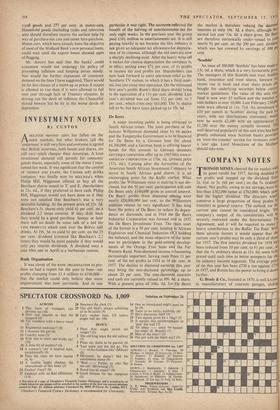INVESTMENT NOTES
By CUSTOS
A BELATED summer calm has fallen on the ,.stock markets, but what brokers call the 'undertone' is still very firm and everyone is agreed that British securities, both bonds and shares, are still very- rpuch cheaper than American. A keen investment demand still persists for consumer goods shares, especially some of the stores I men- tioned last week. It was significant that the control of THOMAS AND EVANS, the Corona soft drinks company, was finally won by BEECHAM'S when Philip Hill, Higginson offered to buy all the Beecham shares issued to T. and E. shareholders at 21s. 6d., if they preferred to have cash. Philip Hill, Higginson would not have done so if they were not satisfied that Beecham's was a very desirable holding. At the present price of 21s. 3d. Beecham's 5s. shares only yield 41 per cent. on a dividend 2.2 times covered. If they drift back they would be a good purchase. Sooner or later there will no doubt be some talk of a bid for VINE PRODUCTS which took over the Britvic soft drinks. At 19s. 3d. to yield 6f per cent. on the 25 -per cent, dividend (covered like Beecham's 2.2 times) they would be more popular if they would only pay interim dividends. A dividend once a year (this one in April) is a barbarous custom.
Rank Organisation It was clever of the RANK ORGANISATION to pro- duce so bad a report for the year to June-net profits slumping from £1.4 million to £196,000- that the market could only believe that some improvement Was now inevitable. And in one
particular it was right. The accounts reflected the benefit of the halving of entertainments tax for only eight weeks. In the previous year the group paid £l0f million in entertainments tax. It is still paying heavily in tax because the film industry is not given an adequate tax allowance,for deprecia- tion of its cinemas, although the old ones are now a sharply declining asset. After the heavy write-off it makes for cinema depreciation the company is, in effect, paying away 87f per cent. of its profits in income tax and profits tax. Shareholders can now look forward to some television relief as the Southern TV station, in which it has a third inter- est, has just come into operation. On the estimated first year's profits Rank's third share should bring in the equivalent of a 13+ per cent. dividend. Last year's dividend was cut from 122 per cent. to 5 per cent., which costs only £63,000. The 5s. shares fell to 9s. but have since picked up to 10s. 6d.
De Beers
A wider investing public is being attracted to South African mines. The joint purchase of the famous Williamson diamond mine by DE BEERS and the Tanganyika Government is to be financed for De Beers by a German loan for about £4,300,000, and a German bank is offering bearer bonds for this amount to German investors carrying a conversion offer up to 1965 into ANGLO- AMERICAN CORPORATION at 170s. 6d., (present price 157s. 6d.). Coming after the formation of the American South African Investment.Company to invest in South African gold shares, it is an encouraging point for the Kaffir market. What profits the Williamson mine is making is not dis- closed, but the 50 per cent. participation will cost De Beers only £160,000 gross in annual interest. De Beers' profits from diamond mining were nearly £24,000,000 last year, So the Williamson addition cannot be very significant. It has long been the policy of De Beers to reduce its depen- dence on diamonds, and in 1944 the De Beers Industrial Corporation' was formed and in 1952 the De Beers Investment Trust. The main asset of the former is a 50 per cent. holding in African Explosives and Chemical Industries (ICI holding the balance), and the main objective of the latter was to participate in the gold-mining develop- ments of the Orange Free State and the Far Western Rand. Non-diamond income is becoming increasingly important, having risen from 11 per cent. of the net profits in 1954 to 16 per cent. in 1957. The decline in diamond earnings this year may bring the non-diamond percentage up to about 20 per cent. The non-diamond interests and cash are currently valued at 89s. 6d. a share. With a present price of 108s. 9d. for De Beers the market is therefore valuing the diamon interests at only 19s. 3d. a share, although the earned last year 33s. 4d. a share gross. De Beer are therefore intrinsically under-valued to yiel nearly 9+ per- cent. on the 200 per cent. divides which was last covered by earnings of 490 Itel cent.
`Scotbits'
An issue of 300,000 `Scotbits' has been made 31 13s. 6d. a share, which is a very favourable price. The managers of this Scottish unit trust, holding bank, insurance and trust shares, foresaw the, recent rise in bank and trust share prices and bought the underlying securities below current market quotations. The value of this unit trust fund is now over £5 million and the number 0 unit-holders is over 10,000. Last February 250,01 units were offered at 11 s. 71c1. An investment 0 £10 per month in `Scotbits' during the past ten years, with net distributions reinvested, would now be worth £2,480 with an appreciation of £1,280 over the money actually invested. The well-deserved popularity of this unit trust has been greatly enhanced since Scottish banks provided an 'over-the-counter' service for investors nearly a year ago. Lord Monckton of the Midland should take note.


































 Previous page
Previous page